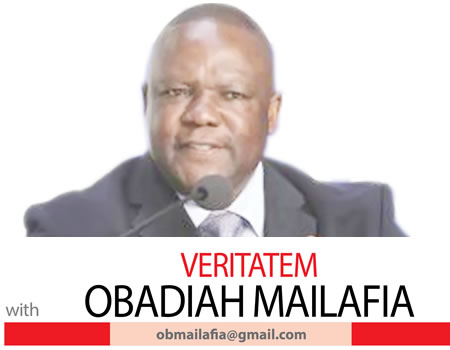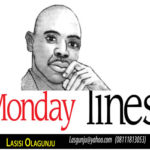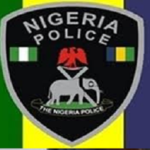On May 14 this year, the Director-General of the World Trade Organisation, WTO, Roberto Carvalho de Azevedo of Brazil, announced that he will be stepping down by 31 August, a year before his mandate is due to end. A distinguished diplomat, he was elected to the post in May 2013.
Mechanisms have been set in motion to find a successor. Eight candidates have been shortlisted:Jesús Seade Kuri of Mexico; Abdel-Hamid Mamdouh of Egypt; Tudor Ulianovschi of Moldova; Yoo Myung-hee of Korea; Amina Mohammed of Kenya; Mohammed Maziad Al-Tuwaijri of Saudi Arabia; and Liam Fox of Britain.
We were somewhat confused when the Nigerian candidate was first announced as Yonov Frederick Agah, only to be substituted for Ngozi Okonjo-Iweala. Agah is a seasoned trade diplomat with a doctorate in international trade economics. He was Nigeria’s Ambassador to Geneva, with multiple accreditations to the UN and WTO. He was appointed Deputy Director-General of the WTO in October 2013, where he has served with distinction.
Ngozi Okonjo-Iweala needs no introduction. She is a renowned international development expert with a first degree from Harvard and a doctorate from MIT. She was Nigeria’s famous Finance Minister and Coordinating Minister of the Economy. She joined the World Bank’s highly competitive Young Professional’s Programme where, over a 25-year career, she rose to the Number 2 position as Managing Director, Operations. She is a globally recognised brand. She has moved among the movers and shakers from the UN and the African Union to the World Economic Forum, WEF. She is currently Board Chair of Gavi, the global Vaccine Alliance. She n as also been a Senior Advisor to the prestigious French investment bankers Lazard Frères. The African Union recently named her a member of the group mobilising international financial resources for the novel coronavirus pandemic. Remarkably, she has been appointed by South African President Cyril Ramaphosa as the Chair of the country’s influential Economic Advisory Council. She is also on the External Advisory Board of the IMF. She is a fluent French speaker, with some working knowledge of Spanish.
The WTO is the world’s foremost international organisation dealing with the management and regulation of global trade. It was officially created in January 1995 as successor to the General Agreement on Tariffs and Trade, GATT. Many of my gentle readers may not realise that the liberal open international trading regime that we enjoy today is not a product of chance, but of painstaking negotiations. In hard times, most countries would rather close their doors from their neighbours. The fact that they don’t is largely because of the rules-based global trading regime that was hammered out over decades of multilateral negotiations.
During the Bretton Woods Conference of 1944, the world powers led by the United States and Britain began negotiations on the post-war international economic order. The two principal negotiators were John Montgomery White of America and John Maynard Keynes for Britain. Keynes was the most outstanding economist of the century. He irritated the Americans by insinuating that “they have the money, but we have the ideas”. His ideas were influential in the construction of the IMF and the World Bank and in constructing the gold-dollar international monetary order that prevailed until its repudiation by President Richard Nixon in the summer of 1972.
The negotiations for international trade began during 1948. The proposal to create an International Trade Organisation, ITO, unfortunately fell through. The General Agreement of Tariffs and Trade, GATT, emerged as a compromise.
From Adam Smith to David Ricardo and Jagdish Bhagwati, the greatest economists have taught that an open international trading system provides the best guarantee for universal prosperity. World wars have been unleashed because of financial collapse andhyper-inflation stemming frombeggar-thy-neighbour trade wars.
Economic history shows that earlier industrialisers such as Britain and France were always in favour of free trade while the late-comers such as Germany and the young American Republic were opposed to it. Thenineteenth century German economists Frederick List was bitterly opposed to free trade. So was Alexander Hamilton, Treasury Secretary and one of the American Founding Fathers. Both cited the “infant industry” argument as justification for protectionism.
The countries that once championed trade protectionism – the advanced industrial economies of North America and Europe — are ironically the ones at the fore-front of international free trade. It seems to be a law of nature that free trade will always disproportionately benefit the rich and powerful at the expense of the poor and vulnerable. By contrast, some of the most impoverished countries in the world – most of them in Africa, Latin America and South Asia – are those demanding for more fairness in the global trading system. Organisations such as the UN Conference on Trade and Development, UNCTAD, and the International Trade Centre, ITC, both in Geneva, are among the principal agencies working to promote equity and fairer participation of developing countries in international trade.
The WTO currently has 164 member countries. Its protocols cover such issues as Multilateral Agreements on Trade in Goods; General Agreement on Trade and Services; Review of Governments’ Trade Policies; Dispute Settlement; and the Agreement on Trade-Related Aspects of Intellectual Property Rights. The WTO operates on the basis of the Most Favoured Nation treatment, MFN, non-discrimination, reciprocity, binding and enforceable commitments, transparency and judicial settlement of trade disputes.
As far back as 2001, the Doha Round was launched to ensure that the benefits of globalisation extend to the poorest nations of the world. Unfortunately, not much progress has been made on that sector. The WTO sadly remains dominated by the most powerful countries. Certain decisions are made in the so-called “Green Room meetings” that exclude low-income developing countries.
At a time of populism and seeming retreat from multilateralism, it seems to me evident that the quality of leadership at the WTO matter profoundly for our common future.
The 8 candidates are all outstanding and highly accomplished leaders on their own right. But, with all respect, I believe Ngozi Okonjo-Iweala towers above the others in the breadth of her experience and her depth of exposure as an economist and international civil servant. Her reputation as a reformer and an internationalist will speak for her. Her cosmopolitan outlook will obviously helpin bridging the gulf between North and South.
It is rather regrettable that the African Union could not collectively present one single candidate as we would have expected. Instead, we have three. That is likely to spread the odds against our continent. Our African brethren may be feeling that they have already given enough concessions to Nigeria. There is Akinwumi Adesina at the African Development Bank; Amina Mohammed as Deputy Secretary-General at the UN; and Benedict Oramah as President of Afrexim Bank. My response would be that Ngozi is Ngozi — a class act. She is a world citizen and a proud symbol of African personality. She once ran for the Presidency of the World Bank. She missed only because it was an election year and Barrack could not risk losing American votes.
One of the strongest arguments in our favour is that no African has held this top job since the GATT was established in 1948. From the creation of WTO in 1995, the Directors-Generals have been: Renato Ruggiero of Italy (1995-1999); Mike Moore of New Zealand (1999-2002); Supachai Panitchpakdi of Thailand (2002-2005); Pascal Lamy of France (2005—2013); and Roberto Azevedo (2013—2020). It is our turn!
There are some who view her stewardship as Finance Minister in highly unfavourable terms. Some would even dismiss her as an agent of the Washington institutions. My response is that nobody is perfect.
Ngozi’s campaign team recently complained that some unscrupulous Nigerians have been undermining her candidature through a whispering campaign. The allegations centre on underhanded dealings involving apublic relations outfit known as Mercury. She has protested her innocence.
On Wednesday 15 July, she appeared before the General Council of the WTO chaired by Ambassador David Walker of New Zealand. We understand that she acquitted herself with distinction. I earnestly hope that the Nigerian government will put everything at her disposal to ensure that she clinches this job. She will be a great ambassador for our country.
YOU SHOULD NOT MISS THESE HEADLINES FROM NIGERIAN TRIBUNE
WATCH TOP VIDEOS FROM NIGERIAN TRIBUNE TV
- Relationship Hangout: Public vs Private Proposals – Which Truly Wins in Love?
- “No” Is a Complete Sentence: Why You Should Stop Feeling Guilty
- Relationship Hangout: Friendship Talk 2025 – How to Be a Good Friend & Big Questions on Friendship
- Police Overpower Armed Robbers in Ibadan After Fierce Struggle






